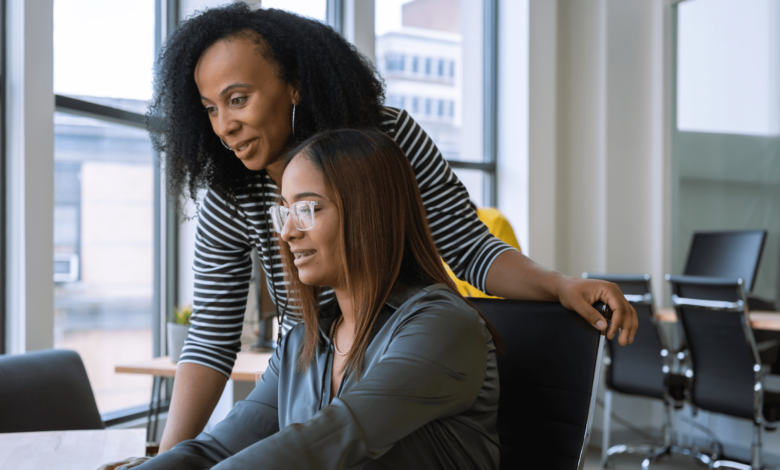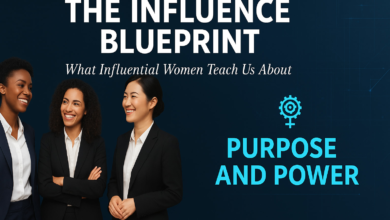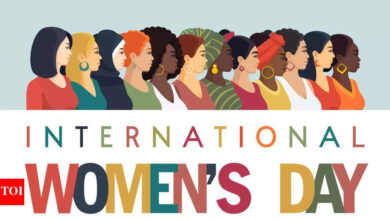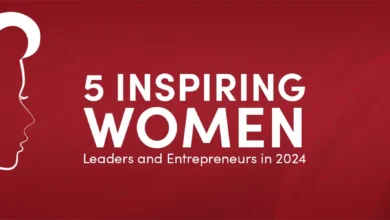Driving female empowerment through mentorship

Women make up nearly half the world’s population, yet represent just 42% of the professional services industry’s workforce, with this figure further falling to 32% when looking at leadership positions1. And research suggests that companies with higher female representation in top management positions achieve significantly higher returns on equity than peer companies with lower representation2. What steps can be taken to invest in women, strengthening around half of the world’s population? In the workplace, consistently implementing long-term strategies that embody diversity, inclusivity and gender equity are key.
Drawing inspiration from this year’s International Women’s Day theme, ‘Inspire Inclusion,’ we are focusing on how investing in women can create effective change and long-term growth opportunities. Mentorship and sponsorship programs set the scene for an unspoken pay-it-forward principle, in that all takeaways can have a lasting positive effect not only on the individuals, but the entire organization. The empowerment of one is the empowerment of all.
We explore stories of Arcadians who exemplify this, providing inspiration for how we can create opportunities for women and more broadly, organizations, to realize growth, representation and mutual value through mentorship.
A story of growth: building bridges from boundaries
Mentee: Pradnya Sawant, Associate Principal Engineer, Geotechnics
Mentor: Ashish Prakash, Country Director India
The Harvard Business Review found that women are more likely to experience burnout at work than men, given their inability to say ‘no’. Pradnya faced the same challenge, and was looking to make a change, establishing healthier work boundaries aligned with her leadership goals. She shares how enrolling in the company’s mentorship platform, which connected her with Ashish, a leader seasoned in time management strategies helped her get there, and the value this created.
Realizing mutual growth
Being a senior leader, Ashish had much experience to draw from and share with younger mentees. In addition to learning how to prioritize tasks and fine tune her organizational practices, Pradnya was also keen on gaining Ashish’s insights on making quick decisions and handling difficult conversations.
Ashish recommended a book ‘Eat that Frog’ by Brian Tracy…It provides ways to avoid procrastination and getting to the most difficult task first, referring to it as ‘the ugliest frog’. I’ve always followed an organized schedule for my daily tasks but would do the easier tasks first and keep the harder tasks for later. This changed my outlook…and has been a game-changer for me.
Although Pradnya initially sought advice, Ashish gained as much, discovering new insights about his current leadership.
Talking with Pradnya has helped me with my blind spots …these discussions helped me to reflect on my relationships with my direct reports and relate to situations on ground.
While the collaboration set the ground for mutual development, Pradnya was able to hone her management strategies and learn how to streamline her workload and navigate tricky interactions by redefining priorities and boundaries.
Building future leadership
In a mentor-mentee relationship, everyone is both the teacher and learner. Ashish already walked the path that Pradnya needed help with. At the same time, Pradnya’s experiences opened opportunities for rediscovery and reflection on Ashish’s part.
Pradnya’s boldness and fresh insights steer her confidently as she explores new leadership opportunities and emerges as a formidable mentor.
I am proud of the consistent effort from both of us during our monthly sessions…I believe our mentoring journey has evolved with every session as we continue exploring my leadership style, polishing my management skills and readying up for the next stage in my career.
A story of allyship: Equalizing gender dynamics
Sponsee: Jennifer Bennett, Senior Environmental Engineer
Sponsor: Eric Putnam, Operations Director, Environment, Resilience
Having experienced the lack of representation both as a First Nations person and a woman, Jennifer sheds light on the challenges she faced while building her career. Coming from a culture where gender division poses no threat to power dynamics, Jennifer has established her strengths as a leader, which her sponsor Eric quickly recognized. Listen to how their exchange illustrates how privilege can be transformed into allyship in support of representation for underrepresented groups.
Source link




